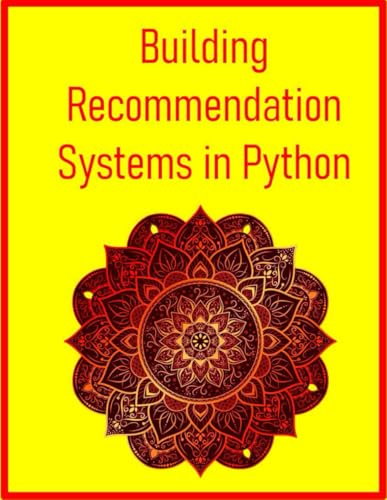Verwandte Artikel zu Building Recommendation Systems in Python: Design,...
Building Recommendation Systems in Python: Design, Build, and Evaluate Recommender Engines with Machine Learning & AI in Python: From Collaborative Filtering to Deep Learning & Production Deployment - Softcover

Inhaltsangabe
You'll Learn
Understand the Foundations of Recommendation Systems: Grasp the core principles, historical context, and formal problem definition of recommendation systems, including user-item interactions and feedback types.
Identify Key Challenges in Recommender Systems: Learn to recognize and address common hurdles like data sparsity, the cold start problem, scalability, and ethical considerations in recommendation engine development.
Navigate the Recommendation System Landscape: Explore a comprehensive taxonomy of algorithms, including collaborative filtering, content-based methods, matrix factorization, and deep learning approaches, along with their diverse use cases across industries.
Master Essential Python Libraries and Tools: Become proficient in using core data science libraries such as NumPy, Pandas, and Scikit-learn, along with specialized tools like Surprise, Implicit, TensorFlow, and PyTorch for building recommendation systems.
Perform Robust Data Collection and Preprocessing: Acquire the skills to gather, clean, transform, and represent various types of data—user, item, interaction, and contextual—essential for training effective recommendation models.
Implement Core Recommendation Algorithms: Gain hands-on experience building and applying fundamental algorithms like User-Based and Item-Based Collaborative Filtering, and Content-Based Filtering from scratch and using established libraries.
Apply Matrix Factorization Techniques: Understand and implement advanced methods such as SVD, FunkSVD, ALS, and NMF to uncover latent factors in user-item interactions for accurate predictions.
Design and Utilize Knowledge-Based Systems: Learn when and how to leverage explicit knowledge and rules to build effective recommendation systems, particularly for complex items or sparse data scenarios.
Develop Hybrid Recommendation Approaches: Discover strategies for combining different recommendation techniques to overcome individual limitations and improve overall system performance and robustness.
Integrate Deep Learning into Recommenders: Explore how neural networks, including NCF, Autoencoders, RNNs, and CNNs, can model complex patterns and enhance recommendation accuracy, especially with diverse data types.
Incorporate Context into Recommendations: Understand the significance of contextual information and apply techniques like Tensor Factorization and Factorization Machines to build more personalized and relevant context-aware systems.
Explore Reinforcement Learning for Dynamic Recommendations: Get an introduction to framing recommendation as an RL problem, utilizing concepts like Multi-Armed Bandits and Q-Learning for adaptive and sequential recommendations.
Evaluate Recommendation Systems Effectively: Master a range of offline and online evaluation metrics, including MAE, RMSE, Precision, Recall, NDCG, and A/B testing, to rigorously assess model performance and business impact.
Build Scalable Recommendation Engines: Learn architectural considerations, data pipeline design, model serving strategies, and distributed computing frameworks necessary for deploying robust, production-ready recommendation systems.
Analyze Real-World Recommendation Systems: Examine detailed case studies of prominent recommendation systems from industry leaders like Netflix, Amazon, Spotify, and YouTube to gain insights from practical applications.
Anticipate Future Trends in Recommendations: Stay ahead by understanding emerging areas such as Explainable AI, conversational recommenders, cross-domain systems, federated learning, and the role of LLMs.
Die Inhaltsangabe kann sich auf eine andere Ausgabe dieses Titels beziehen.
Neu kaufen
Diesen Artikel anzeigenEUR 8,53 für den Versand von USA nach Deutschland
Versandziele, Kosten & DauerSuchergebnisse für Building Recommendation Systems in Python: Design,...
Building Recommendation Systems in Python: Design, Build, and Evaluate Recommender Engines with Machine Learning & AI in Python: From Collaborative Filtering to Deep Learning & Production Deployment
Print-on-DemandAnbieter: California Books, Miami, FL, USA
Zustand: New. Print on Demand. Bestandsnummer des Verkäufers I-9798290262673
Anzahl: Mehr als 20 verfügbar
